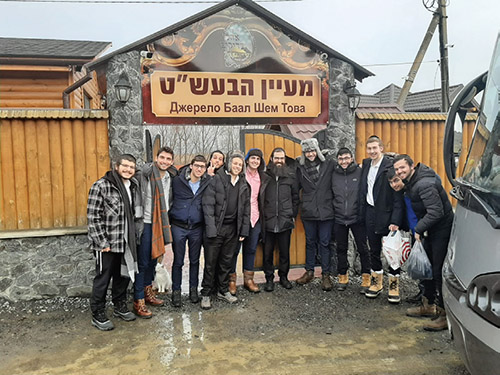


As what seems to amount to a tradition in the Orthodox community, many people choose to spend their winter break in the warm weather of Florida or the Caribbean. But unconventionally, one group of bnei aliyah traveled to find a different type of warmth.
Led on a trip organized by Tzama Nafshi, an organization dedicated to fostering Jewish identity and education, over 40 men ventured out into the Ukrainian winter in search of deepening their Yiddishkeit and strengthening their avodas Hashem.
The trip, called Baderech, included visits to the Baal Shem Tov, the Alter Rebbe of Lubavitch, Rabbi Levi Yitzchak of Berditchev and Rebbe Nachman of Breslov. In addition to these famed cemeteries, the travelers were given the opportunity to visit other historical sites such as the Baal Shem Tov’s mystical water well, his personal shul, Babi Yar, and the home where Rebbe Nachman left the world.
Inspiration flowed forth by traveling to the tzaddikim who founded the chasidic movement. Participants were accompanied by inspiring teachers and experienced guides: Rav Mordechai Kaplan and Rebbe Yehoshua Gerzi of Yeshivat Lev HaTorah. They were also joined by Yeshivat Aish HaTorah’s Rav Moshe Chaim Eade, and by Rav Moshe Tzvi Weinberg, maggid shiur at Yeshiva University and mashpiah of Congregation Beth Abraham in Bergenfield, New Jersey. The presence and leadership of such a beloved group of educators who are responsible for perpetuating the thought and study modeled by the tzaddikim we visited helped cultivate an authentic experience that both informed and inspired the entire group.
Zev Levitis, a recent Yeshiva University graduate and student of Rav Moshe Tzvi Weinberg, recounted that “spending time in the Baal Shem Tov’s shul with the rabbi who introduced me to his teachings was a moment that will stick with me for my entire life.”
The trip spanned four days, including Shabbos in Mezibuz, and was filled with constant movement, productivity and meaning. Even when given the chance to rest, most members of the group continued their search for growth, singing, learning and davening. Indeed, when asked what their favorite part of the trip was, many pointed to some of the things that were not found on the schedule. For example, each night, Rabbi Gerzi and Rabbi Weinberg facilitated informal discussions, “sichos chaveirim,” on varied topics in Jewish thought, Halacha, and hashkafa that would go on until around 4 a.m.
When asked to reflect on his experience, Rabbi Weinberg expressed that “the trip was truly life changing.” He continued to articulate his feelings in more depth, saying: “While some question the value of going on such a trip, to me, it brought the chasidic teachings to life. I certainly have a new appreciation for the Gemara that teaches that the righteous are considered very much alive even in their passing. Their influence is still tangible.”
In addition to surprisingly tame weather, the group enjoyed the best of both ruchniyus and gashmiyus: comfortable accommodations, great food and a tight-knit bond of friendship that is hard to imagine was born after only five days together.
One traveler enjoyed the trip so much that he did it twice. When asked why he went on Baderech for a second time, Shmuel Bergman, currently a student in Landers College for Men, said that “the Tzama Nafshi trips are incredible in every single way, the rebbeim, the incredible chevra, the food, and the experiences. The trip gave us a chance to experience what living chassidus means, giving us a chance to really connect to the tzadikim, Hashem, and ultimately ourselves.”
Most of the trip members took their return flight to Israel, where they hoped to continue using their break for the service of God. Now, with winter breaks coming to a close and regular lives resuming, the trip participants head back home but with the added warmth provided by the greatest tzaddikim to have ever walked the earth.
Elliot Fuchs is a New York-based writer. He will soon be attending Georgetown Law. You can follow him on twitter @Elliot_Fuchs.










